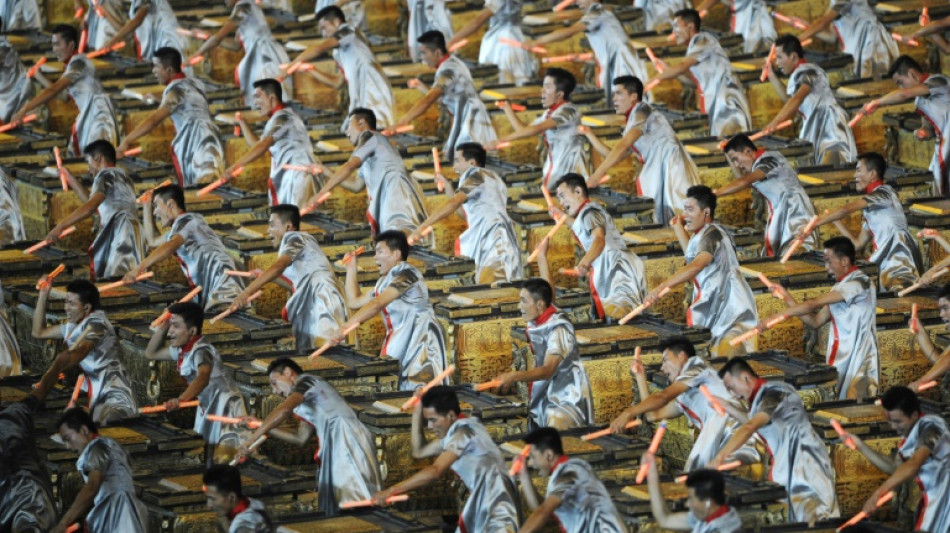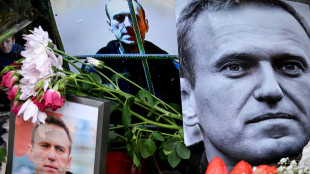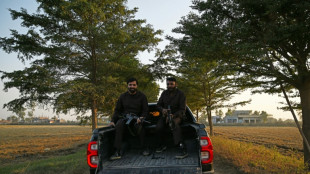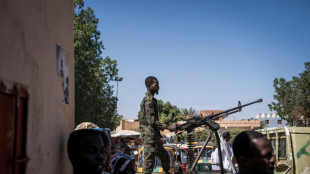
From LA's rocketman to London's skyfall: iconic Olympics openings

As Paris prepares for the opening ceremony of the Olympics on July 26 with what promises to be a spectacular parade of boats along the river Seine, AFP looks back at memorable Olympics curtainraisers of the past.
- 1896: Gigantic choir in Athens -
On April 6, 1896, the first modern Olympic Games opened in the Panathenaic Stadium in Athens, newly restored in white marble, in front of 80,000 spectators, some in traditional Greek attire, others in suits.
The King proclaimed the opening of the Games and the Olympic hymn, written by Greek composer Spyridon Samaras, was then sung by a 150-strong choir, accompanied by nine philharmonic orchestras.
- 1936: "Heil Hitler" in Berlin -
On August 1, 1936, Adolf Hitler opened the Summer Games in Berlin as a Nazi German showcase, aimed at presenting foreign spectators with the image of a peaceful and tolerant country.
Swastikas bedecked the Brandenburg Gate as musical fanfares announced the dictator's arrival to a largely German crowd of 100,000, who hailed him with Nazi salutes and cries of "Heil Hitler".
When the athletes filed through the stadium, the German delegation also performed the Nazi salute.
- 1964: Japan's rebirth -
The Tokyo Olympics marked Japan's great return to the world stage after its defeat and destruction two decades earlier in World War II.
In a poignant symbolic nod to its pacifist credo, the last carrier of the Olympic torch was Yoshinori Sakai, an athlete born on August 6, 1945, the day the atomic bomb was dropped on Hiroshima.
- 1984: Rocket man in Los Angeles -
Held at the height of the Cold War, boycotted by the Soviet Union and 14 Eastern bloc allies, the opening of the 1984 Los Angeles Olympics was designed to show off America's technological prowess.
In a futuristic tour de force that took millions of viewers by surprise, "Rocket man" Bill Suitor flew into the Memorial Coliseum using a hydrogen peroxide-fuelled jet pack.
- 1996: Muhammad Ali lights up Atlanta -
In 1996, a global audience of three billion held its breath as boxing superstar Muhammad Ali momentarily conquered his trembling due to Parkinson's disease to defiantly raise the Olympic flame and then slowly lower it to light the cauldron, marking the start of the Atlanta Games.
Ali's participation had been kept top secret. The crowd gasped in surprise as he emerged from behind a curtain in a white tracksuit, his arms and head shaking erratically.
- 2000: Aboriginal hero shimmers in Sydney -
At the millennium Games in Sydney, Aboriginal star Cathy Freeman symbolised the desire to reconcile the people of Australia when she ascended to the cauldron in a cascading waterfall to light the flame.
Ten days later she won the 400m final before an ecstatic crowd in what was to be her last major race.
- 2008: China flaunts global power -
The opening of the Beijing Games, a coming out party for a nation whose global power was rising as quickly as its wealth, took place to the thundering beat of 2,008 drums in the "Bird's Nest" stadium.
A host of dancers, acrobats and trapeze artists went on to tell the story of the Great Wall of China, the Silk Road and China's love affair with martial arts in an awe-inspiring display that drowned out the political controversies and pollution concerns that plagued the run-up to the Games.
- 2012: Queen Elizabeth's London skyfall -
The late Queen Elizabeth II played a starring role at the London Olympics, appearing alongside James Bond actor Daniel Craig in a film shown at the opening ceremony in which she appeared to skydive into the stadium from a helicopter.
Oscar-winning director Danny Boyle, of "Slumdog Millionaire" and "Trainspotting" fame was the mastermind of the ceremony, which showcased British history with a hefty dollop of the nation's offbeat humour.
The show included a tribute to the National Health Service, a major source of national pride, with children wearing pyjamas bouncing on 320 giant hospital beds.
W. Winogradow--BTZ

 London
London

 Manchester
Manchester
 Glasgow
Glasgow
 Dublin
Dublin
 Belfast
Belfast
 Washington
Washington
 Denver
Denver
 Atlanta
Atlanta
 Dallas
Dallas
 Houston Texas
Houston Texas
 New Orleans
New Orleans
 El Paso
El Paso
 Phoenix
Phoenix
 Los Angeles
Los Angeles



